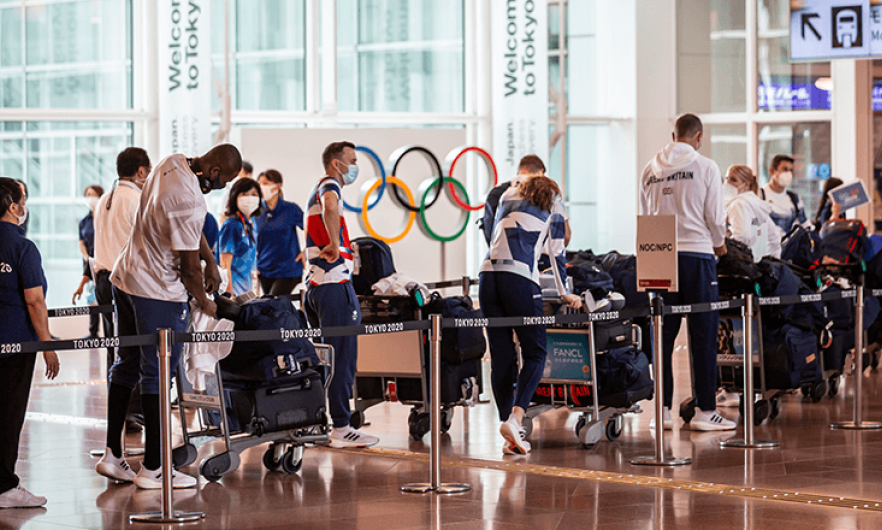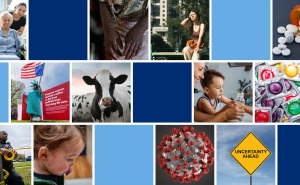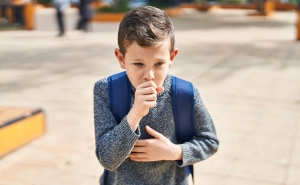The Tokyo Olympics and COVID-19
A public health expert and Olympic silver medalist’s take on the safety of the Tokyo Olympics.

INTERVIEW BY STEPHANIE DESMON
In addition to being a public health expert, Tara Kirk Sell is an Olympic silver medalist in swimming—giving her a unique perspective on what to expect from the Tokyo Olympics.
In this Q&A, adapted from the June 23 episode of Public Health On Call, Stephanie Desmon talks to Sell, PhD ’16, MA, a senior scholar at the Center for Health Security, about what we can expect from the Olympics this year, how the Olympic committees are working to keep athletes safe, what could go wrong, and why we need the Olympics now more than ever.
Doctors in Japan have called for the games to be canceled. Can these games be conducted safely?
I really do think the games can be conducted safely. We've come a long way in the past year. A year ago, we didn't really know a whole lot about how the disease was transmitted. Now we know how it's transmitted, what we need to watch out for, how to control spread. We know more about how to do appropriate contact tracing, and what measures work and what doesn't. We also have great vaccines.
Japan is really ramping up its vaccination rate. It's estimated that about 80% of people in the Olympic Village are going to be vaccinated. This number has really risen in recent months as countries got more access to vaccines and got their athletes vaccinated.
Tokyo is taking the three C's approach: Avoid close spaces, crowds, and close contact. The Olympics Village is working to keep population low by limiting volunteers and sending athletes home when not competing.
What plan does Japan have in place to protect the athletes?
There are a couple of playbooks that have recently come out. There is the Tokyo Olympic Playbook, where they have outlined the different safety measures, and they are pretty robust. They involve daily testing for the athletes, whether vaccinated or not. There are also measures to reduce contact, transmission, and interaction in the village. The athletes are not going to be mixing as much, which is unfortunate from the social perspective and [in terms of making friends from different countries. So, will the implementation of these measures be as good as the planning?
Will the athletes be expected to wear masks?
The athletes are going to be expected to wear masks except for when they're competing, eating, sleeping, or in kind of isolation.
Will the games have spectators?
In the first week of July, Tokyo announced that they would be barring all spectators from the Games after declaring a state of emergency following a surge in COVID-19 cases.
What will the role of testing be? I saw somewhere that they're going to do A samples and B samples, and they're going to test them multiple times.
Because they're testing people who we don't expect to probably show up with that many positives, we have to worry about false positives that will keep people out of the games when they shouldn’t be. Athletes will begin by being tested with a saliva antigen test. If that test is positive, they’ll do a PCR test from the same sample. If that test is positive, then they’ll pull another sample and check it. There will be cases, but can they catch cases and implement these protective measures in time to prevent those cases from becoming large clusters? And I think the measures they've put in place will prevent that.
What kind of things can go wrong?
We could see that the testing gets backed up. If that happens, there are plans in place for determining whose tests will be prioritized. But if we are expecting every athlete to be tested every day, and volunteers to be tested every couple of days—that's a lot of tests. And that's sometimes very hard.
We could see some communication breakdowns. We might see some transportation issues. The transportation is going to be much more individualized than the large buses used when I was at the games. For this year’s games, they will have much more private transportation for the teams. So, you’ll have bubbles within bubbles within bubbles. But I don't think this is going to be perfect. I do think there will be problems. Unfortunately, there may be problems that no one expects, and the games will have to react very quickly.
There was concern about the Rio Olympics being canceled several years ago because of Zika. Is this similar?
I think this is different. This requires a lot more thought, and that's why there's such attention on the playbooks. These Games are going to be very different from what we've seen in the past. It won't be that kind of revelry that people expect.
There's so much that could go wrong. We're still in the middle of a global pandemic. Why do we need to have the Olympics at all? Couldn't we just cancel them?
I actually feel like there's no moment in time where we need this coming together more than we do right now. As we come out of this pandemic, we’re seeing the divisions and nationalism. The Olympics really shows us how we can come together—and how we're going to need to come together to get fully out of this pandemic.
Stephanie Desmon, is an award-winning journalist and the director of media and public relations at the Johns Hopkins Bloomberg School of Public Health.
RELATED CONTENT
Public Health On Call
This conversation is excerpted from the June 23 episode of Public Health On Call.





